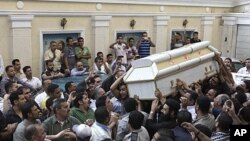Bloody sectarian clashes erupted overnight after a crowd of Islamic extremists massed in front of a Coptic Christian church in the Cairo suburb of Imbaba, claiming that a woman who had allegedly converted to Islam was being held inside the church. Twelve people were killed and dozens wounded in the violence, while two churches were also set ablaze.
Egyptian authorities have imposed a curfew in the Cairo district of Imbaba, the scene of a vicious sectarian battle between Muslim extremists and Coptic Christians trying to defend their neighborhood.
It was not clear which side began shooting, although both Christians and Muslims accused "thugs" from outside the neighborhood of igniting the conflict. Dozens of mostly young men threw stones and petrol bombs at each other, while others traded gunshots. Two churches were torched during the melee and a nearby apartment building, housing Christians, was gutted.
Military police intervened to stop the fighting, as firemen worked to extinguish the blazes at the Mar Mena and Holy Virgin churches. Egypt’s Supreme Military Council later announced that 190 people allegedly involved in the violence had been arrested. Prime Minister Essam Sharaf, who canceled a trip to the Persian Gulf, chaired an urgent Cabinet session.
Justice Minister Abdel Aziz Al Gindy told journalists after the meeting the government was taking decisive steps to prevent the situation from spiraling out of control.
He said sectarian strife is putting the country in peril and the government is trying to save it from what he calls a conspiracy. He added that authorities will use an iron hand against anyone who provokes violence and police will be deployed in sensitive areas of the country. He insisted the law will be used to protect freedom of worship and to protect houses of worship from attack.
Top Muslim and Christian leaders condemned the bloodshed and pleaded for calm. The Sheikh of Al-Azhar University, Ahmed Tayeb, called for an urgent meeting of Christian and Muslim religious leaders in an effort to find a formula to contain the crisis.
Sheikh Haitham Islam of Al-Azhar’s Fatwa Committee blamed "trouble-makers" from the deposed regime of former President Hosni Mubarak of trying to create a crisis.
He said he was calling for the creation of popular committees to discuss the violence and to try to avoid civil strife, along the lines of what is taking place in Libya, Yemen, or Syria. He went on to accuse elements of the former government of trying to stir up violence in the country.
Coptic Bishop Theodosius of Giza insists there is no conflict between Muslims and Christians in the area where the violence occurred, accusing outside forces of provoking troubles.
Christian attorney Naguib Gobrail, who heads the Egyptian Human Rights Forum, complained on Egyptian TV that authorities are not taking strong enough measures to stop attacks against Christians.
A small group of Coptic Christians demonstrated in front of the U.S. Embassy in Cairo, urging American intervention to protect Christians in Egypt.
Egypt to Use 'Iron Hand' for Security After Deadly Sectarian Violence














